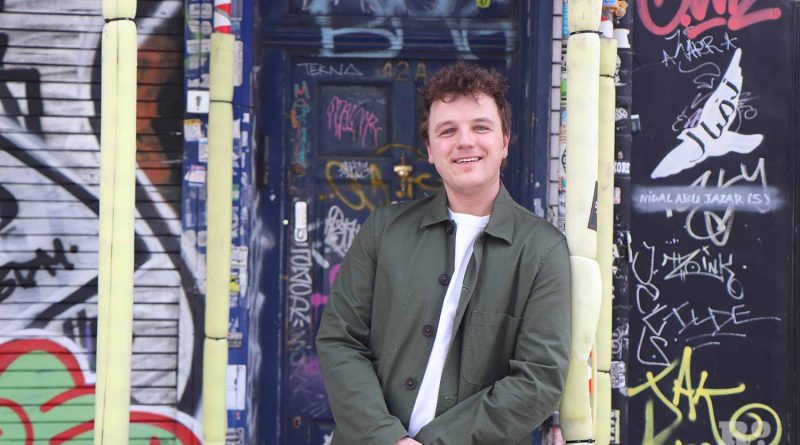Social Streets Fellow Felix Naylor Marlow talks about his experience reporting for Tower Hamlets
A recent Social Streets Fellow talks about learning a pioneering form of constructive journalism and what this taught him about Tower Hamlets.
When first looking for writing jobs after graduating from university Felix Naylor Marlow was drawn to Social Streets CIC as a publishing company pioneering a new model of constructive journalism, telling stories that strengthen the community.
‘I wanted to get into journalism, and I saw that Social Streets was doing a very different kind of journalism to anyone else, and I thought that was quite inspiring and exciting,’ he said.
‘I read some of the stories on Roman Road LDN (the flagship title), and I remember reading the article on Irish traveller Danny Mongan. I thought that was a really interesting story about an underrepresented community that I didn’t know about, and I wanted to work on stories like that and meet people that I wouldn’t normally meet.’
The Fellowship is a six-month part-time paid scheme involving weekly workshops, one-to-one tuition and mentoring. Delivered by Social Streets, the not-for-profit news and media organisation that publishes community news platforms, it provides hands-on experience in constructive journalism, a form of reporting developed to address tabloidisation, sensationalism, misinformation and negative bias in the press.
During the Fellowship, Fellows become Deputy Editors of one of Social Streets’ four community news titles in Tower Hamlets and are given weekly assignments. In the last module Fellows produce an in-depth series that examines an under-reported subject in the borough.
During the Fellowship, Naylor Marlow became Deputy Editor of the community news platform Whitechapel LDN and worked alongside two other Fellows working for Poplar LDN and Bethnal Green LDN, Robert Postings and Emilia Randall.
Unlike traditional journalism training, Naylor Marlow was responsible for a live title, gaining real-world experience under the guidance of Editor-in-Chief, Tabitha Stapely.
‘Compared to the NCTJ diploma in journalism, it’s definitely more current, and you’re actually working. First of all, you’re getting bylines every week, second of all, you’re meeting real people,’ he said.
‘A massive part of journalism is calling up people and speaking to people. In the first week, I was so daunted by that, but because you’re working constantly and you’ve got to produce stories, I quickly gained confidence and got over that fear.’
Now, Naylor Marlow feels ‘ahead of the game’ compared to his cohort at his NCTJ training. His first interview was Shabana Begum, a woman who combatted depression and anxiety by attending the Sew and Support programme at the Working Well Trust in the Shadwell Centre.
‘I felt privileged to interview this woman,’ Naylor Marlow said. ‘I felt that I was thrown into the deep end but it goes back to the opportunities Social Streets gives you, to meet so many different people and to hear their stories and tell them.’
‘Tower Hamlets is its people, it’s got some amazing stories, and there’s no better place to be a journalist starting up than Tower Hamlets, it’s such a good patch.’
Felix naylor marlow
The Fellowship culminates in a 6,000-word project on a pressing topic in Tower Hamlets where Fellows bring together all their learning. Naylor Marlow wrote four articles about the decline in the Bangla language among the younger generation of Bangladeshis in Tower Hamlets that were published on the community news platform Whitechapel LDN.
‘It was about the Bengali language disappearing in Tower Hamlets, and how fewer British-Bangladeshis are speaking it.
‘What I really loved about the project is it’s a community that I’ve never been engaged with at all. I’m a white man, I didn’t know anything about the British Bangladeshi community before I started doing the project, but working at Social Streets allows you to meet people, talk about their passions, tell their stories and give them a voice.’
At Social Streets, Naylor Marlow wrote news and features about pertinent social issues affecting the borough. Stories had to be rigorous yet benefit the community.
‘Unlike most mainstream media, we’re not exploiting people for the sake of a headline. Thinking about my project, I didn’t want to have my voice in the story, I just told people a story that wasn’t being told. Constructive journalism can do that.’
The first article in the series focuses on what Bangla means to the first and second wave of Bangladeshis who migrated to the UK in the 20th century followed by in-depth research into the declining presence of Bangla in schools, the role of Tower Hamlets’ six Bengali newspapers, and how young musicians are redefining what it means to be British and Bangladeshi in the 21st century.
‘Tower Hamlets is its people, it’s got some amazing stories, and there’s no better place to be a journalist starting up than Tower Hamlets, it’s such a good patch,’ he said. ‘It’s a great place to work, there are loads of interesting things happening and people are keen to tell their stories.’
For Naylor Marlow, being trained one-to-one by editor-in-chief Stapely was an invaluable experience. ‘Tabitha is a critical but fair editor, who will give you all the skills you need to launch your career in journalism.’
Social Streets will be recruiting its next cohort of Fellows in July 2024. Visit Socialstreets.co for more information.
Would you like to sponsor a Fellow? Contact us if you want to help train a local person in community journalism.


